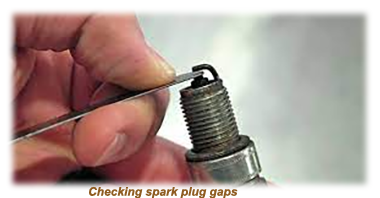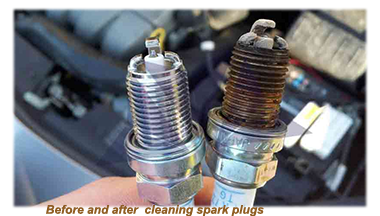Examine the Spark Plug Wires: Examine the spark plug wires for evidence of damage or wear. Misfires or poor ignition can be caused by cracks, fraying, or brittleness. If necessary, replace the spark plug wires with new ones appropriate for the engine of your historic car.
Prevent Oil and Carbon Deposit build up: Repair any engine oil leaks as soon as possible, as oil can foul spark plugs. Carbon buildup on the spark plugs can also degrade their performance. Engine maintenance and tune-ups on a regular basis can help prevent these problems.
Check Torque values: When replacing new spark plugs or reinserting cleaned ones, make sure to use the torque values recommended by the manufacturer. Overtightening can cause thread damage, while undertightening might result in misfires.
Avoid Overtightening: When inserting spark plugs, avoid overtightening to avoid thread damage in the cylinder head.
Establish and Follow a Maintenance Schedule: Stick to the specified maintenance schedule for your historic car, including spark plug replacement intervals. Classic cars may have different needs than current vehicles, so consult the owner's manual or a professional mechanic for assistance.
![]() The gap is the distance between the center electrode and the ground electrode on the spark plug. Over time, this gap can change, which can affect the performance of the engine. Check the gap regularly and adjust it as needed using a spark plug gap tool.
The gap is the distance between the center electrode and the ground electrode on the spark plug. Over time, this gap can change, which can affect the performance of the engine. Check the gap regularly and adjust it as needed using a spark plug gap tool.

 .
.![]() Spark plugs can wear out over time, which can affect the performance of the engine. Check the spark plugs for any signs of wear, such as a build-up of deposits or a worn-down electrode. If a buildup of brown/grey deposits on the side electrode is detected, there is no reason to panic as this is an indication of typical wear. Signs of black soot appearing on the electrodes and insulator tip indicate that the plug has been fouled by carbon, sometimes caused by dirt in the air filter, a combination of air and fuel mixture that is too rich or a plug that is too cold.
Spark plugs can wear out over time, which can affect the performance of the engine. Check the spark plugs for any signs of wear, such as a build-up of deposits or a worn-down electrode. If a buildup of brown/grey deposits on the side electrode is detected, there is no reason to panic as this is an indication of typical wear. Signs of black soot appearing on the electrodes and insulator tip indicate that the plug has been fouled by carbon, sometimes caused by dirt in the air filter, a combination of air and fuel mixture that is too rich or a plug that is too cold.
If the spark plugs are worn, they should be replaced.
![]() The heat range of a spark plug refers to its ability to dissipate heat from the combustion chamber. Make sure that the plugs are set to the correct heat range spark plug for your engine.
The heat range of a spark plug refers to its ability to dissipate heat from the combustion chamber. Make sure that the plugs are set to the correct heat range spark plug for your engine.
![]() Make sure the spark plugs you choose are the correct thread size for your engine. The correct diameter of the plug is calculated using the width of the threaded portion of the plug at its widest point, including the threads. In the event that the diameter of the plug is slightly less than specified, but it can be usually rounded up.
Make sure the spark plugs you choose are the correct thread size for your engine. The correct diameter of the plug is calculated using the width of the threaded portion of the plug at its widest point, including the threads. In the event that the diameter of the plug is slightly less than specified, but it can be usually rounded up.
Using the wrong plug diameter can cause damage to the engine and cause it to malfunction.

![]() . Over time, carbon and other contaminants can build up on the spark plug.
. Over time, carbon and other contaminants can build up on the spark plug.
To clean spark plugs, begin by removing any debris from the outside of the spark electrode. Next, use 220-grit sandpaper to carefully sand away the buildup - use a light touch to avoid damaging the metal. A small file can also be used to clear any obstinate buildup.
Cleaning the spark plugs regularly can help to improve the performance of the engine.
![]() It's generally recommended to replace the spark plugs every 30,000 miles or so, depending on the vehicle and driving conditions. A professional mechanic can give you a better idea on how often to replace the spark plugs based on your classic car.
It's generally recommended to replace the spark plugs every 30,000 miles or so, depending on the vehicle and driving conditions. A professional mechanic can give you a better idea on how often to replace the spark plugs based on your classic car.
 Consider getting a professional check-up. If you're not sure what is wrong with your spark plugs or if you are experiencing problems with your engine, it's a good idea to have a professional mechanic check the spark plugs and make any necessary repairs.
Consider getting a professional check-up. If you're not sure what is wrong with your spark plugs or if you are experiencing problems with your engine, it's a good idea to have a professional mechanic check the spark plugs and make any necessary repairs.
It's a good idea to check and maintain your spark plugs regularly as a preventative measure, especially if you're a classic car enthusiast and you use the car frequently. Regularly checking and maintaining your spark plugs will help ensure that your classic car runs smoothly and reliably.
br4






